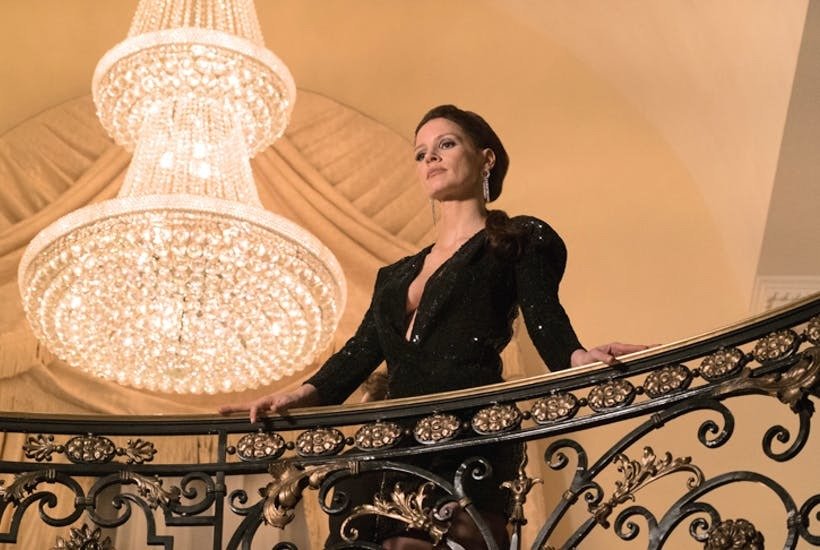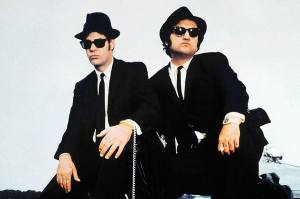Molly’s Game
marks the directorial debut of Hollywood’s most celebrated screenwriter, Aaron Sorkin, and is based on his adaptation of the memoir by Molly Bloom. Nope, me neither, but she’s the one-time Olympic skier who, at the age of 26, started a high-stakes poker game for ‘the richest, the most powerful men in the world’ and ended up with the FBI in her face. Poor Molly, we’re meant to think, when the FBI ends up in her face, but I was delighted. Bang her up! This has been posited as the antidote to all those male-driven, big money Wall Street films, with Sorkin even declaring Ms Bloom a ‘feminist icon’. Well (she says, haughtily), we will see about that.
The film’s opening happens at breakneck speed and is, to be fair, quite exciting. It’s a rat-a-tat-tat account of Molly’s early skiing career, as narrated by Molly (Jessica Chastain), who will narrate throughout. The film then swoops forwards in time, cutting to her arrest by the FBI (bang her up!) and meetings with her lawyer (Idris Elba, with an iffy accent). I want to be mean about the narrative structure, but it is a perfectly acceptable one. The film just seems to bring out every bit of meanness in me.
Post-skiing, Molly, an over-achiever mentored by her pushy father (Kevin Costner) and with a mother somewhere in the background who doesn’t ever properly figure (that meanness again), intends to go to law school, but decides to take a year off first, and ends up in Hollywood working as PA to a guy who runs underground poker games in a nightclub basement and charges her with overseeing them. On her first outing to the basement, she wears a plain old J.C. Penney dress, but she makes decent-ish tips, so the following week wears a sexy, sparkly, low-cut number and makes $3,000 — ‘I had just made $3,000 in one night!’ she tells us, because the script is often supremely literal — and as all this was happening, what I was not thinking was: here it is! Feminism in action!
To cut a very long, very rambling story short — there’s 140 rambling minutes of this — she quickly becomes the brain of the operation, sets up her own games, hires hotel suites and also Playboy models to schmooze and serve drinks (more feminism in action). Tobey Maguire, Leonardo DiCaprio and Ben Affleck are all on the record as players, and were named in her memoir, but here they’ve all been merged into the fictional character of Player X (Michael Cera), which is disappointing. The poker is explained, at a rapid clip, using various gimmicky techniques but if your card-playing doesn’t extend much beyond Uno or Go Fish you may still be at a loss, as I was (though I do accept that may be my limitation). And it’s not key. The key thing is that as the stakes get higher and higher, members of the Russian mafia start taking their place at her table, not that she knew. (Someone trucks up with a Monet as collateral, and your suspicions aren’t aroused?)
Sorkin, who has been criticised for the portrayal of women in many of his films (Steve Jobs, The Social Network, Moneyball), obviously sees this as his riposte, in which case, God help us all. He does have a great ear for the rhythm of language, but it can’t help him here. It isn’t just the literalism of his direction that kills it dead — it’s never show or tell; always show and tell — it’s also all we’re asked to buy. Elba’s character who, in other times, would have been played by Jimmy Stewart — he’s one of those straight-arrow good-man lawyers — initially refuses to take on Molly’s case, because it’s morally worrying. But he then undergoes a volte-face, not just because here’s a woman in trouble, so he’d best save her, but because isn’t she actually innocent? Wasn’t she just playing the boys at their own game? Isn’t she the best? Isn’t she a role model? This is what the film wants you to take away with you, rather than, say, an impression of someone who exploited gambling addicts and, in some instances, even destroyed lives purely for her own personal gain. Would you more easily accept such behaviour from a man? Possibly, but feminism is not role reversal. And what did she want all that money for?
We don’t know because this film does not go deep, character-wise. There’s no nuance, no reflective downtime, and it ends with what may be the worst cod-psychology scene of all time. It all comes down to daddy issues, apparently. Oh, boo-hoo. There’s that meanness again…


















